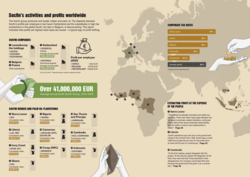Bread for all, Alliance Sud and the German Network for Tax Justice | 20 October 2021
International statement
Cultivating fiscal inequality: The Socfin report
A new report by Bread for all, Alliance Sud and the German Network for Tax Justice on the tax strategy of agribusiness corporation Socfin reveals how multinational companies can shift profits from countries where they produce commodities in Africa and Asia to tax havens like Switzerland. These strategies are highly unjust, even if they may comply with OECD rules. Tax avoidance of this nature is tantamount to extracting profits at the expense of people in the countries of production.
The Socfin group is an agro-industrial corporation based in Luxembourg,It produces and trades rubber and palm oil from nearly 400 000 hectares of concessions in Africa and Asia. On average, the Socfin Group made 41 million euros in profits annually from 2014-2020. Back in 2010, Socfin established the group’s management and several subsidiaries in Switzerland – reportedly for tax reasons. These subsidiaries in tax haven Switzerland make millions of profits.
This new report reveals possible routes of profit shifting by analyzing Socfin’s financial reports. It corroborates its findings by comparing profits per employee: profits are highest where taxes are lowest. In the African countries where Socfin operates, corporate income taxes vary between 25 and 33% and Socfin’s profits per employee are as low as 1642 euros. In Switzerland, where the tax rate is less than 14%, the profits per employee are as high as 116 000 euros.
Globally, about 80 billion euros in profits are being shifted annually from developing countries to low-tax jurisdictions like Switzerland. Profit shifting and tax avoidance, though not necessarily illegal, works against efforts to achieve global justice and shrinks the fiscal space of states to fulfil their human rights obligations. According to Paul Larry George, Chairman of the Alliance for Rural Democracy in Liberia, where Socfin operates, “it is important to know that Liberia is not getting the maximum benefits from the extraction of its natural resources. Tax avoidance is part of the problem and it contributes to keeping the country poor, especially where corporate structures are mainly designed to make use of favorable tax regimes in other countries.”
In the three countries where Socfin operates that are studied in the report — Liberia, Sierra Leone and Cambodia — plantation managers appear to cut costs wherever possible: they pay very little for the land they lease, for the tree crops they cut down, for the workers they hire, for the Corporate Social Responsibility measures they promise. A large part of the profits that are generated this way end up in Switzerland, the study indicates. This makes it more urgent that Socfin respond to calls from local communities, for example to return contested lands, respect their environment, ensure that living wages are paid to all workers on the plantations and end all rights abuses.
Tax laws around the world allow companies to shift profits to where taxes are lowest. Switzerland must change its special tax rules which work as an incentive for multinational corporations like Socfin to shift profits. Further, all governments should shift to a system of taxing profits in the countries where workers generate them.
For more information, please see:
https://bit.ly/socfin_steuergerechtigkeit
Signatories:
Bread for all, Switzerland
Alliance Sud, Switzerland
Netzwerk Steuergerechtigkeit, Germany
Alliance for Rural Democracy, Liberia
JUSTICITIZ, Liberia
Green Advocates International, Liberia
Natural Resource Women’s Plattform, Liberia
Green Scenery, Sierra Leone
Malen Land Owners and Users Association (Maloa), Sierra Leone
Sierra Leone Network on the Right to Food (Silnorf), Sierra Leone
The Bunong Indigenous People Association (Bipa), Cambodia
Community Forest Watch, Nigeria
Jeunes Volontaires pour l’Environnement (JVE), Ivory Coast
Union des Villages Déguerpir (UVD), Ivory Coast
Synergie Nationale des Paysans et Riverains du Cameroun (Synaparcam), Cameroon
Réseau des Acteurs du Développement Durable (RADD), Cameroon
Youth Volunteers for Environment, Ghana
GRAIN
ReAct Transnational, France
Association Française d’Amitié et de Solidarité avec les Peuples d’Afrique (AFASPA), France
SOS Faim, Luxembourg
FIAN Belgium, Belgium
Milieudefensie, Netherlands
Creatives for Justice, Switzerland
Rainforest Rescue, Germany
Attac, Germany












